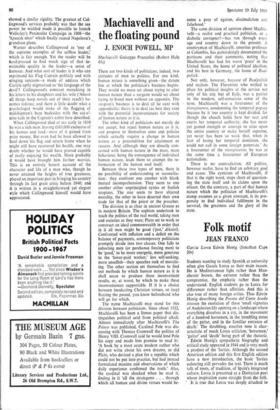Machiavelli and the floating pound
J. ENOCH POWELL, MP
There are two kinds of politicians; indeed, two attitudes of men to politics. For one kind, human nature is something given—the datum line at which the politician's business begins. They would no more set about trying to alter human nature than a surgeon would set about trying to breed men without an appendix. The surgeon's business is to deal (if he can) with appendicitis; theirs is to deal (as best they can) with the potential inconveniences for society of human nature as it is.
The other kind of politicians not merely do not accept, but reject human nature as it is, and propose to themselves aims and policies which actually require a change in human nature as a precondition for attainment or success. And although they are directly con- cerned with human nature in the mass, mass behaviour, being the consequence of individual human nature, leads them to attempt the re- formation of the human soul itself.
Between these two types of men, there is no possibility of understanding or reconcilia- tion: they confront one another with blank mutual incomprehension. They seem to one another either unprincipled cynics or foolish utopians. The one seem to have abjured morality, the other to have deserted their own trade for that of the priest or the preacher.
The division is as clear in ancient Greece as in modern Britain. The sophists undertook to teach the politics of the real world, taking men and societies as they were; Plato set to work to construct an ideal commonwealth in order that in it all men might be good (`just,' dikaioi). Confronted with inflation and a deficit on the balance of payments, contemporary politicians promptly divide into two classes. One falls to exhorting men (or perchance forcing men) to be 'good,' to be more energetic, more generous to the `lower-paid worker,' less self-seeking, more unselfish—their speeches reek of moralis- ing. The other section set themselves to find out methods by which human nature as it is shall cease to produce these inconvenient results, or, at worst, by which to make these inconveniences supportable. If it is a choice between inculcating Christian virtues, or (say) floating the pound, you know beforehand who will go for which.
The name Machiavelli may stand for this division between politicians. Since about 1532, Machiavelli has been a litmus paper that dis- tinguishes political acid from political alkali. Almost immediately after Machiavelli's The Prince was published, Cardinal Pole was dis- cussing with Thomas Cromwell the politics of Henry VIII. Cromwell said he would lend Pole his copy and made him promise to read it: 'A book by a most acute modern author who did not write about his own dreams, as did Plato, who devised a plan for a republic which could not be put into practice, but had instead formulated maxims and observations of which daily experience confirmed the truth.' Alas, the cardinal was shocked when he read it, finding in it 'all the strategems . . . through which all human and divine virtues would be-
come a prey of egoism, dissimulation and falsehood.'
The same division of opinion about Machia- velli—a realist and practical politician, or a diabolic corrupter?—has run through every age and country down to the present. A countryman of Machiavelli, emeritus professor at Columbia, has painstakingly documented the partisans and their comments, noting that Machiavelli has had his worst 'press' in the United States, the home of political idealism, and his best in Germany, the home of Real- politik.
Not only, however, because of Realpolitik and realism. The Florentine who wished to place his political insights at the service not only of his city but of Italy, was a patriot in the modern, self-conscious sense of the term. Machiavelli was a forerunner of the risorgimento, condemning the temporal papacy because by it 'our country is kept divided, for though the church holds here her seat and exerts her temporal authority, she has never yet gained strength or courage to seize upon the entire country or make herself supreme, yet never has been so weak that, when in fear of losing her temporal dominion, she could not call in some foreign potentate.' As a forerunner of the risorgimento, he was at the same time a forerunner of European nationalism.
There is no contradiction. All politics, however realist, have to find an arbitrary goal and cause. The cynicism of Machiavelli, if that is the right word, stops short of question- ing the state itself and its claims upon the citizen. On the contrary, a part of that human nature which the politician of Machiavelli's stamp assumes as a given constant, is its pro- pensity to find individual fulfilment in the survival, the greatness and the glory of the state.






































 Previous page
Previous page